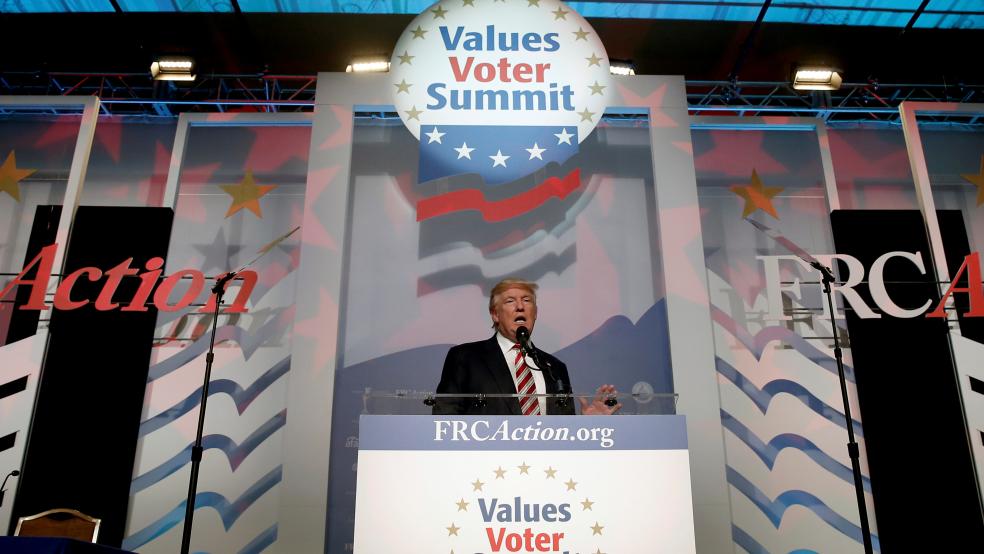In remarks before the Values Voter Summit in Washington on Friday, Republican Presidential nominee Donald Trump railed against a 62-year-old addition to the federal tax code, known as the Johnson Amendment. In Trump’s telling the law has stripped away the first amendment rights of preachers, pastors and other religious leaders.
“The Johnson Amendment has blocked our pastors and ministers and others from speaking their minds from their own pulpits,” he said. “If they want to talk about Christianity, if they want to preach, if they want to talk about politics, they’re unable to do so. If they want to do it, they take a tremendous risk that they lose their tax-exempt status.
Related: Right Wing Christian Leader Tony Perkins Calls Trump Vote a ‘Calculated Risk.'
“All religious leaders should be able to freely express their thoughts and feelings on religious matters. And I will repeal the Johnson Amendment if I am elected your president, I promise. So important.”
In typical Trump fashion, he wildly overstated the facts surrounding the Johnson Amendment -- but that doesn’t lessen the importance of the issue to his audience. The prohibition on electioneering from the pulpit has long rankled conservative Christian groups, and for nearly a decade, at least one organization, the Alliance Defending Freedom, has been encouraging religious leaders to openly defy the law every year on what it calls “Pulpit Freedom Sunday.”
The Alliance Defending Freedom also describes the restrictions in the tax code as government interference in religion. “Today, the IRS can use the Johnson Amendment to tell pastors what they can and cannot preach,” the group’s website warns. “This law aims to censor your sermon if the IRS labels it ‘political.’”
This, too, overstates the case. Writing in NonProfit Quarterly, Erin Bradrick explains: “The argument often presented for repeal of the Johnson Amendment asserts that it prohibits religious institutions and their leaders from speaking freely on political candidates and elections in violation of the First Amendment. However, this isn’t entirely accurate.
Related: Trump Still Singing Putin’s Praise and His Chorus Is Growing
“The more accurate statement is that religious institutions that wish to retain their tax-exempt status under Section 501(c)(3) are prohibited from speaking freely with respect to political candidates and elections if such speech constitutes intervention in a political campaign. Religious institutions (or other exempt entities) that are willing to cede their tax-exempt status under Section 501(c)(3) are free to engage in as much political speech and campaign intervention as they would like (subject, of course, to any other applicable election laws).”
So, to be clear, the question here is not whether the government can censor the speech of a minister in his pulpit. It can’t. The question is whether or not the government should be required to give expensive tax breaks to organizations that actively advocate political candidates.
It’s a legitimate subject for debate, and there’s no question about where politically active evangelical Christian leaders come down on the issue.
The Values Voter Summit where Trump spoke Friday was hosted by Tony Perkins, the head of the ultra-right wing Family Research Council. Perkins spoke in July at the Republican National Convention, where he delivered a tepid endorsement of Trump in which the only substantive issue he discussed was Trump’s promise to work to repeal the Johnson Amendment.
Related: Trump’s Taco Truck Fear Campaign Diverts Attention From the Real Issues
At the time, he told The Fiscal Times that he had “no certainty” that Trump would do what he promised and conceded that a vote for Trump was, at best, a calculated risk.
“You know what? Nations are built on calculated risk,” he said. “Yeah. You could say we’re taking a calculated risk, but we’re at a point where we have to as a nation because what we have seen in the last seven and a half years has put the nation fiscally and culturally on the edge.”
Trump’s support for the repeal of the Johnson amendment likely goes a long way toward explaining why a huge percentage of evangelical Christian voters have fallen in line behind a thrice-married with no substantive record of social conservatism.
As someone said, politics makes strange bedfellows.





